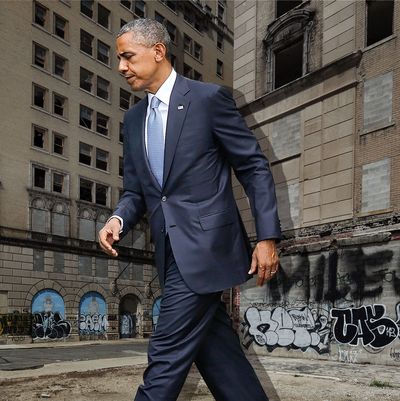
In his latest column, George Will journeys to Chicago to depict its troubles as emblematic of the failed Democratic Party agenda. (Headline: “Rahm Emanuel reaps the whirlwind of Democratic rule.”) Chicago thus joins an ever-growing list of cities that can be held up on the right as a microcosm of the liberal agenda. The most usual favorite example of such arguments is Detroit, which an endless succession of conservatives, including Will himself, have made into an ideological cautionary tale. But cities like New York, Baltimore, or even just cities in general can play the same role in the conservative imagination. Even presidential candidates like Marco Rubio and Jeb Bush have cited the failures of urban policy as the premise for their economic strategy. The specifics of the critique run the gamut from the rational and technocratic to amorphous racialized suburban terror, and they invoke a reactionary distrust of cities that runs deep in conservative thought.
What makes the right’s renewed attention to cities interesting is that cities now supply a narrower stage for them to present their fears of liberalism. It was not so long ago that conservatives looking to demonstrate the horrors of the liberal agenda did not have to pluck out some localized example of it. Until recently, their prime exhibit of liberal dystopia was the United States of America. The chief executive of that political unit, Barack Obama, had implemented a sweeping progressive agenda. Conservatives routinely described (or predicted) a socialist horror unfolding all around them, as the stimulus, Obamacare, Dodd-Frank, the expiration of the upper-bracket Bush tax cuts, and other reforms threatened to turn the United States into Greece.
But now the deficit has fallen by three-quarters, jobless claims have dropped to their lowest level in more than four decades, Obamacare is working reasonably well, and the predicted Randian collapse has receded farther than ever off the horizon. The economy may not be booming, exactly, but it is no longer tenable for conservatives to decry Obama’s America as a post-capitalist wasteland. The search for the ruins of Liberal America has thus taken them to locales whose problems have, at most, an oblique relationship to Obama’s agenda. Conservatism’s urban fixation is a search for vindication in a non-apocalyptic world.
Now, here is an irony. When conservatives cite urban policy as the rationale for small government, they are often, in the most narrow sense, correct. Urban policy is rife with unjustifiable regulation. As I’ve argued, actually-existing Big Government can be found mostly at the state and local level. Republicans have, accordingly, seized on them. Bush has attacked burdensome occupational licensing requirements for jobs that protect incumbents and lock working-class job seekers out of promising livelihoods. Rubio has defended Uber and the sharing economy.
These are shrewdly chosen symbols of big government. There is, alas, a mismatch between the symbolic targets of Republican anti-government themes and their policy agenda. The Republicans aren’t proposing to scale back regulations in cities and states. They’re proposing to scale back government at the national level. Their speeches attack regulations limiting Uber pushed by the taxi industry, but their platforms attack health care for the poor and progressive taxation. Rather than reorient their platform to attack big government where big government is most deserving of attack, they are instead using those forms of government as rhetorical cover for a traditional agenda.
If you approach the question of Big Government in a purely ideological way, then the Republican position makes sense. The purest form of ideological conservatism regards Big Government as a unified entity, and to attack it anywhere is to attack it everywhere. No reason to be troubled at the disconnect between using, say, dumb restrictions on housing supply as a club with which to beat Medicaid. It’s all the same to them.
These kinds of conservatives tend to project a mirror image of their crude anti-statism onto liberals, imagining that the Obama administration defends more intrusive government is indiscriminately as they oppose it. That, too, is false. The Obama administration has actually positioned itself on the pro-market, anti-regulatory side of many of the state and local regulatory issues. Obama’s budget proposes grants to state governments that cut back their licensing requirements. It also suggests a similar mechanism to encourage cities to scale back their zoning laws and allow more building.
A world where the Republican Party focused its attacks on government on the state and local government level is a world where the party would be playing a constructive role in the domestic-policy debate. In the world we now inhabit, the right’s rhetorical attacks on cities are an implicit concession that its broader beliefs about Obama’s America have collapsed.






























